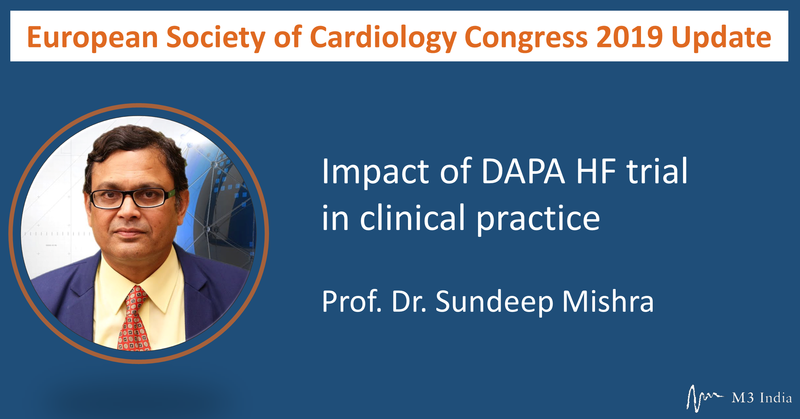Impact of DAPA HF trial in clinical practice: Prof. Dr. Sundeep Mishra
M3 India Newsdesk Sep 04, 2019
Dr. Sundeep Mishra offers his expert commentary on the late breaking results from DAPA HF trial which sought to investigate whether dapagliflozin would prove useful in treating patients with heart failure, even in the absence of diabetes.

The sodium-glucose co-transporter 2 (SGLT2) inhibitors are now second drugs to be added (after metformin) and have now practically become a standard of care in patients with NIDDM. Furthermore several analyses revealed that there could be a role of this group of drugs in diabetic patients with heart failure; HFrEF - EMPA-REG OUTCOME and CANVAS trials. Moreover, signals from DECLARE-TIMI 58 revealed that there could be a role of this drug even in non-diabetic patients with HFrEF. If indeed this could happen it could be a game-changer in therapy of heart failure.
DAPA HF set out to prove (or disprove) just that. It enrolled 4,744 adults in 20 countries, of HFrEF (left ventricular EF 40%). NIDDM was present only in ½ of the patients (while half were non-diabetic). Enrolled patients had moderately elevated N-terminal pro-B-type natriuretic peptide and an estimated glomerular filtration rate of ≥ 30 mL/min/1.73. Patients were randomised to receive once-daily dapagliflozin 10 mg or matching placebo, in addition to standard care.
During a median follow-up > 18 months, the primary outcome of CVD death, HF hospitalisation or urgent HF visit was reduced by 26% in the group assigned to dapagliflozin compared vs. placebo (95% CI, 0.65-0.85). Dapagliflozin was associated with significantly improved individual outcomes as well; 17% reduction in all-cause death (95% CI, 0.71-0.97). The treatment effect was consistent across all 14 pre-specified subgroups including more interestingly, in those without diabetes, compared to those with diabetes.
Thus DAPA HF is a "landmark trial" because the magnitude of benefit seen with SGLT2 inhibitors (dapagliflozin) both for primary and secondary endpoints is similar to, if not larger than, those in recent major successful trials, such as SHIFT, EMPHASIS-HF, and PARADIGM-HF. Importantly, quality of life in DAPA HF was also similar, if not better.
Mechanism of Action
The mechanism of action in heart failure is really unknown.
- SGLT2 inhibitors have a mild diuretic effect which may impact of fluid overload.
- They also protect the kidneys, which play a crucial role in the causation of congestion and HF symptoms.
- It impacts myocardial metabolism, making the failing heart more metabolically efficient and therefore improving contractility.
- The sodium hydrogen exchanger may be relevant to decreased risk for sudden cardiac death.
The impact of DAPA HF trial in clinical practice
- This trial opens door for SGLT2 inhibitors in all patients (even non-diabetic) although this finding should be confirmed in large RCTs.
- This trial may also serve as another “nail in the coffin” of loop diuretics in heart failure because of diuretic effect of this new class of drugs.
- At the moment there are nearly 20 ongoing SGLT2 inhibitor trials that should shed light on other agents or to different HF phenotypes notably EMPEROR-Preserved trial.
To read the press release from European Society of Cardiology (ESC) 2019 Congress, click here.
Disclaimer- The views and opinions expressed in this article are those of the author's and do not necessarily reflect the official policy or position of M3 India.
The writer, Dr. Sundeep Mishra is a Professor of Cardiology.
-
Exclusive Write-ups & Webinars by KOLs
-
Daily Quiz by specialty
-
Paid Market Research Surveys
-
Case discussions, News & Journals' summaries